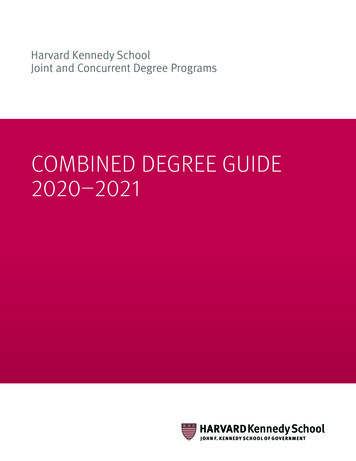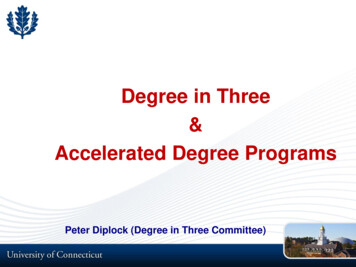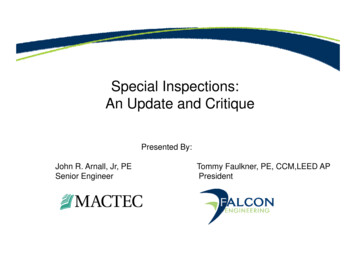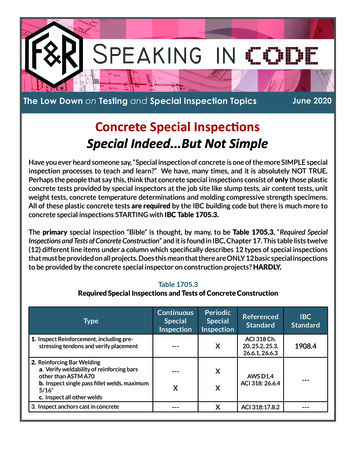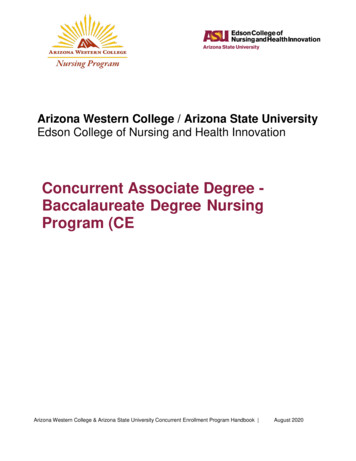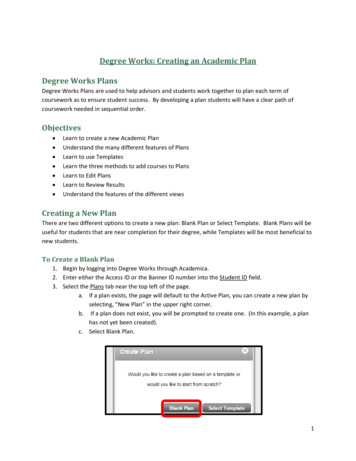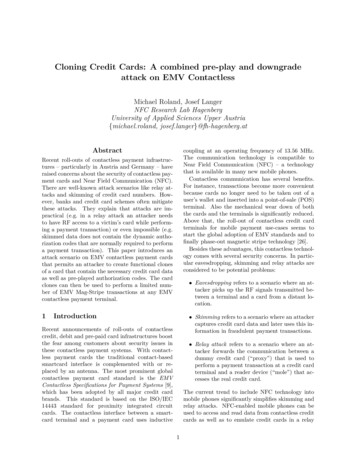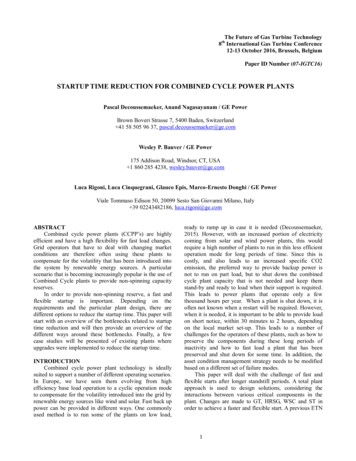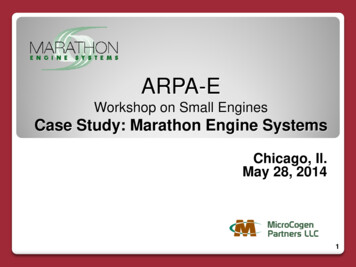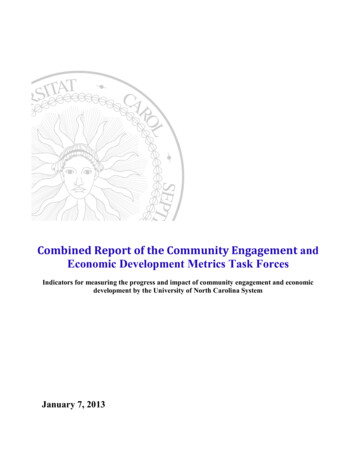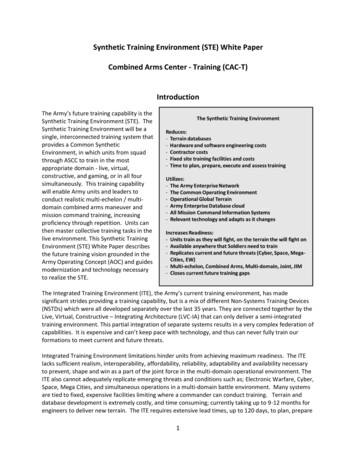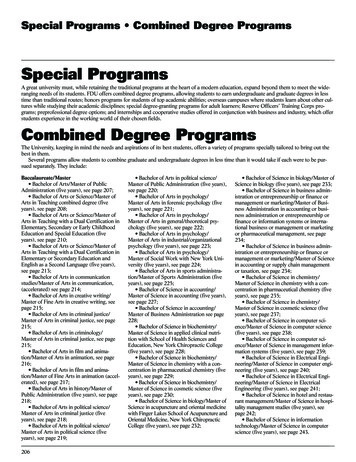
Transcription
Special Programs Combined Degree ProgramsSpecial ProgramsA great university must, while retaining the traditional programs at the heart of a modern education, expand beyond them to meet the wideranging needs of its students. FDU offers combined degree programs, allowing students to earn undergraduate and graduate degrees in lesstime than traditional routes; honors programs for students of top academic abilities; overseas campuses where students learn about other cultures while studying their academic disciplines; special degree-granting programs for adult learners; Reserve Officers’ Training Corps programs; preprofessional degree options; and internships and cooperative studies offered in conjunction with business and industry, which offerstudents experience in the working world of their chosen fields.Combined Degree ProgramsThe University, keeping in mind the needs and aspirations of its best students, offers a variety of programs specially tailored to bring out thebest in them.Several programs allow students to combine graduate and undergraduate degrees in less time than it would take if each were to be pursued separately. They include:Baccalaureate/Master Bachelor of Arts/Master of PublicAdministration (five years), see page 207; Bachelor of Arts or Science/Master ofArts in Teaching combined degree (fiveyears), see page 208; Bachelor of Arts or Science/Master ofArts in Teaching with a Dual Certification inElementary, Secondary or Early ChildhoodEducation and Special Education (fiveyears), see page 210; Bachelor of Arts or Science/Master ofArts in Teaching with a Dual Certification inElementary or Secondary Education andEnglish as a Second Language (five years),see page 213; Bachelor of Arts in communicationstudies/Master of Arts in communication,(accelerated) see page 214; Bachelor of Arts in creative writing/Master of Fine Arts in creative writing, seepage 215; Bachelor of Arts in criminal justice/Master of Arts in criminal justice, see page215; Bachelor of Arts in criminology/Master of Arts in criminal justice, see page215; Bachelor of Arts in film and animation/Master of Arts in animation, see page216; Bachelor of Arts in film and animation/Master of Fine Arts in animation (accelerated), see page 217; Bachelor of Arts in history/Master ofPublic Administration (five years), see page218; Bachelor of Arts in political science/Master of Arts in criminal justice (fiveyears), see page 218; Bachelor of Arts in political science/Master of Arts in political science (fiveyears), see page 219;206 Bachelor of Arts in political science/Master of Public Administration (five years),see page 220; Bachelor of Arts in psychology/Master of Arts in forensic psychology (fiveyears), see page 221; Bachelor of Arts in psychology/Master of Arts in general/theoretical psychology (five years), see page 222; Bachelor of Arts in psychology/Master of Arts in industrial/organizationalpsychology (five years), see page 223; Bachelor of Arts in psychology/Master of Social Work with New York University (five years), see page 224; Bachelor of Arts in sports administration/Master of Sports Administration (fiveyears), see page 225; Bachelor of Science in accounting/Master of Science in accounting (five years),see page 227; Bachelor of Science in accounting/Master of Business Administration see page228; Bachelor of Science in biochemistry/Master of Science in applied clinical nutrition with School of Health Sciences andEducation, New York Chiropractic College(five years), see page 228; Bachelor of Science in biochemistry/Master of Science in chemistry with a concentration in pharmaceutical chemistry (fiveyears), see page 229; Bachelor of Science in biochemistry/Master of Science in cosmetic science (fiveyears), see page 230; Bachelor of Science in biology/Master ofScience in acupuncture and oriental medicinewith Finger Lakes School of Acupuncture andOriental Medicine, New York ChiropracticCollege (five years), see page 232; Bachelor of Science in biology/Master ofScience in biology (five years), see page 233; Bachelor of Science in business administration or entrepreneurship or finance ormanagement or marketing/Master of Business Administration in accounting or business administration or entrepreneurship orfinance or information systems or international business or management or marketingor pharmaceutical management, see page234; Bachelor of Science in business administration or entrepreneurship or finance ormanagement or marketing/Master of Sciencein accounting or supply chain managementor taxation, see page 234; Bachelor of Science in chemistry/Master of Science in chemistry with a concentration in pharmaceutical chemistry (fiveyears), see page 235; Bachelor of Science in chemistry/Master of Science in cosmetic science (fiveyears), see page 237; Bachelor of Science in computer science/Master of Science in computer science(five years), see page 238; Bachelor of Science in computer science/Master of Science in management information systems (five years), see page 239; Bachelor of Science in Electrical Engineering/Master of Science in computer engineering (five years), see page 240; Bachelor of Science in Electrical Engineering/Master of Science in ElectricalEngineering (five years), see page 241; Bachelor of Science in hotel and restaurant management/Master of Science in hospitality management studies (five years), seepage 242; Bachelor of Science in informationtechnology/Master of Science in computerscience (five years), see page 243.
Combined Degree ProgramsB.A./M.P.A.Baccalaureate/Doctorate Bachelor of Science in biochemistry/Doctor of Pharmacy with FDU School ofPharmacy and Health Sciences (sevenyears), see page 244; Bachelor of Science in biology/Doctor of Chiropractic with Life ChiropracticCollege West, Logan University, New YorkChiropractic College, Palmer College ofChiropractic or University of WesternStates, (six years, four months), see page249; Bachelor of Science in biochemistryor biology or chemistry/Doctor of DentalMedicine with Lake Erie College of Osteopathic Medicine School of Dental Medicine (eight years), see page 251; Bachelor of Science in biology/Doctorof Dental Medicine with Rutgers School ofDental Medicine, (seven years), see page252; Bachelor of Science in biology/Medical Doctor with Ross UniversitySchool of Medicine, (eight years), see page253; Bachelor of Science in biology/Medical Doctor with Universidad Autónoma de Guadalajara School of Medicine(seven years), see page 255. Bachelor of Science in biology/Doctorof Osteopathic Medicine with Lake ErieCollege of Osteopathic Medicine (sevenyears), see page 255; Bachelor of Science in biochemistryor biology or chemistry/Doctor of Osteopathic Medicine with Lake Erie College ofOsteopathic Medicine (eight years), seepage 255; Bachelor of Science in biology/Doctorof Pharmacy with FDU School of Pharmacy and Health Sciences (seven years), seepage 257; Bachelor of Science in biology/Doctorof Physical Therapy with Rutgers School ofHealth Professions, (six years), see page262; Bachelor of Science in biology/Doctorof Podiatric Medicine with New York College of Podiatric Medicine (seven years),see page 263; Bachelor of Science in biology/Doctorof Veterinary Medicine with Ross University School of Veterinary Medicine, (sevenyears), see page 264; Bachelor of Science in chemistry/Doctor of Pharmacy with FDU School ofPharmacy and Health Sciences (sevenyears), see page 266.For more information on the array ofaccelerated programs available at FDU,please contact your college dean or schooldirector.Students matriculated into the accelerated five-year programs leading to theB.A./M.P.A., the B.A./M.A. and theB.S./M.S. degrees (except in accounting).The students receive their bachelor’sdegree upon completion of undergraduaterequirements and are moved to a graduateprogram. Students in these curricula whorequire matriculation as graduate students may request conferral of the baccalaureate degrees upon completion of120–123 credits (121 credits forSilberman College of Business) and theB.A. or B.S. requirements. The degree willthen be awarded in accordance with normal University procedures. Students electing this option are advised that they maybecome ineligible for certain benefits uponachieving graduate-student status.Students matriculated into the five-yearprograms leading to the M.B.A. (4 1) orM.S. in supply chain management (4 1) orthe M.A.T. normally complete their undergraduate programs and receive their baccalaureate degrees before entering the graduate portion of the program.B.A./M.P.A.Five-year ProgramUndergraduates who take a major either inhistory or in political science may, duringtheir junior year, apply to the Master ofPublic Administration program offered bythe School of Public and Global Affairs.Students who apply and gain admissionto the M.P.A. program take three M.P.A.courses (PADM6602 Budgeting and Finance, PADM6603 Public Policy Administration and PADM6680 InformationTechnology Management) as free electives.Besides counting toward the B.A., thecredits earned in these three graduatecourses will count toward the 39 creditsthat the M.P.A. requires. For the B.A., allUniversity College general educationrequirements (pages 128–129) and allrequirements pertaining to the undergraduate major (history, page 173; political science, pages 198–199) must be satisfied.For the Metropolitan Campus, go to page218 for the B.A. in history/M.P.A. combined degree and page 220 for the B.A. inpolitical science/M.P.A. combined degree.207
Combined Degree ProgramsB.A. or B.S./M.A.T. QUEST Teacher PreparationB.A. or B.S./M.A.T.QUEST Teacher PreparationFive-year ProgramThe QUEST (QUality in Education,Schools and Teaching) program is offeredby the Peter Sammartino School of Education at the Florham Campus, Madison,New Jersey, and the Metropolitan Campus,Teaneck, New Jersey.The program is open to students whowish to be certified to teach at the earlychildhood (P–3), elementary or secondaryschool level in the area of their liberal artsor science major or in English as a SecondLanguage (ESL). All tracks result in theB.A. or B.S. degree in a liberal arts/sciencemajor with graduate-level advancedcourse work toward a Master of Arts inTeaching (M.A.T.) degree. See below andpages 63 and 131 for additional information.Students may select a QUEST programin general education (regular classroomteacher) at the P–3, elementary or secondary level or in English as a SecondLanguage (ESL). QUEST also offers theopportunity to select a dual certificationprogram in early childhood (P–3), elementary (K–6) or secondary (7–12) andTeacher of Students with Disabilities(TSD). Students desiring the dual certification program need to join QUEST in theirfreshman year.QUEST also offers the opportunity toselect a dual certification program in elementary education (K–6) or secondaryeducation (7–12) with a second certification in English as a Second Language.Students desiring the dual certificationprogram in elementary or secondary education and ESL need to join QUEST intheir freshman year. These students willneed to complete three courses after theirfifth year in the program to finish the ESLcertification.QUEST ProgramStudents typically enter the program intheir freshman year. FDU students andadmitted transfer students may enroll inQUEST in their sophomore or junioryears, subject to an interview with theQUEST adviser, a review of transcriptsand meeting QUEST program admissionsand matriculation requirements.Admission and matriculation in theQUEST program are as follows: 60 earned credits;208 CGPR of 3.00 or greater; and Pass the new Praxis I – CORE Battery,which consists of three tests in basic skillsas follows:1. Core Academic Skills for Educators:Reading2. Core Academic Skills for Educators:Writing3. Core Academic Skills for Educators:MathematicsStudents are required to take and passthe CORE Battery by the end of theirsophomore year to continue in the QUESTprogram. Juniors seeking admission toQUEST must take and pass the COREBattery during their first semester in theprogram. All three exams must be passedfor matriculation. Students who do notpass all three exams may be restricted fromtaking education (EDUC) courses. Students may be exempted from the COREBattery if they meet one of the followingalternatives: SAT (if taken between April 1, 1995, toFebruary 28, 2016): Reading 560;Mathematics 540 SAT (if taken on or after March 1,2016): Reading 610; Mathematics 570 ACT (if taken on or after August 28,1989): English 23; Mathematics 23 If a candidate completed and passed thePre-professional Skills Test (PPST/Praxis I)prior to June 2014, the School of Education will accept passing scores on thoseexams to satisfy the basic skills requirement (passing scores on the PPST are asfollows: Reading 175, Mathematics 174,Writing 173).In addition to the academic study listedbelow, beginning in the first year, the program offers extensive field experiences inselect public schools.Faculty advisers work closely with students, individually and/or in groups, toprovide guidance as students completetheir programs of study.Program Outline1. Students must satisfy all general education requirements and specific departmental requirements for their liberal arts/science major in order to be eligible for aB.A. or B.S. degree in their area of specialization. Students in the QUEST programmust major in a liberal arts/science discipline and will take from 30 to 31 credits ineducation as free electives as undergraduates. These credits satisfy the requirementfor a “minor.” All QUEST students major-ing in psychology, sociology or humanitiesare required to have a minor (15–18 credits) in a content area and/or a middleschool content endorsement.2. Students must continue to meetgrade point requirements (3.00) throughout their time in the QUEST program.3. After 60 earned credit hours, students may be formally matriculated intothe QUEST program. To matriculate, astudent must have a 3.00 cumulative gradepoint ratio and a passing score on theCORE Battery exams in reading, writingand mathematics as described on pages130–131. All three exams must be passed(for all majors and at all grade-certificationlevels). Students should take the COREBattery in their freshman or sophomoreyear. Students who have 60 credits andhave not passed all three sections of theCORE Battery will be restricted in thenumber of education courses they maytake until they pass all three exams.4. Students will be advised when totake their Content Knowledge Praxis IIexams. They will also be advised as to thecurrent required exam(s) for the certification sought. The Praxis II exam is neededto obtain New Jersey State certification.5. At the end of four years, studentswho have met all requirements will be eligible for a B.A. or B.S. degree and willhave up to 15 graduate credits towardstheir Master of Arts in Teaching degree(which requires a total of 36 graduatecredits — 40 credits for the dual certification program). Students will completetheir Apprenticeship (student) Teaching intheir fifth year. Upon completion of theApprenticeship Teaching, students willhave met eligibility requirements forteacher certification and will have at least23 graduate credits towards the M.A.T.Students may decide to complete theremaining graduate courses leading to anM.A.T. in the fifth year or thereafter or topursue only graduate-level courses to complete their teaching certification withoutthe master’s degree. (A master’s degree isnot required for certification in NewJersey.) A third option would be not tocontinue in the fifth year in the School ofEducation.6. New Jersey teacher certificationrequires 3 credits in biology, physiology orhealth. The courses also may be taken tosatisfy college core requirements (foundations and disciplinary perspectives) or theliberal arts/science required courses orelectives.
Combined Degree ProgramsB.A. or B.S./M.A.T. QUEST Teacher Preparation7. In order to complete the Master ofArts in Teaching program in five years, students may need to take courses in summerand winter sessions in years three throughfive, depending upon their particular liberal arts/science program requirements.8. In addition to required courses at thegraduate level for the M.A.T. program, students may choose electives from one areaof specialization, i.e., English as a SecondLanguage (ESL), special education (up to6 credits if not in the dual certification program), instructional technology; or theymay choose a variety of electives fromthose available. It is recommended thatstudents seeking two certifications focustheir graduate electives in a specific area ofcertification for their second certificate.QUEST Program Sequence(Note: All students follow the coursesequence in years one and two and specialize in early childhood (P–3), elementary,ESL or secondary education in years three,four and five.) Registration in all coursesand any substitutions require the adviser’sapproval. Sequence may vary dependingon adviser’s recommendation.CreditsYear 1EDUC1108Seminar in Professional Practice I:The Teacher’s Role in Schooland Community.3EDUC2401Field Experience I.1Total.4Year 2EDUC2209Seminar in Professional Practice II:Teachers as Educational Leaders.3EDUC2402Field Experience II.1EDUC3309Seminar in Professional Practice III:The Functions of Teaching.3Total.7Notes: (1) Graduate-level courses, markedwith asterisks (*), are taken in years threeand four in elementary or secondary specializations for dual undergraduate/graduate credit (maximum 15 credits).(2) Prerequisites for courses in years threeand four: EDUC1108 Seminar inProfessional Practice I: The Teacher’s Rolein School and Community, EDUC2209Seminar in Professional Practice II: Teachersas Educational Leaders, EDUC3309Seminar in Professional Practice III: TheFunctions of Teaching, EDUC2401 FieldExperience I and EDUC2402 Field Experience II.(3) Refer to Graduate Studies Bulletinfor graduate course descriptions.(4) Basic course sequence in years two,three and four may vary slightly dependingupon individual students.CreditsEDUC6819Language Development andLiteracy II*.3EDUC6820Problem-based Strategies forElementary Mathematics*.3Total.11Early Childhood (P–3) SpecializationCreditsYear 3Year 4EDUC3403Field Experience III. 2EDUC6818Language Development andLiteracy I*.3EDUC6819Language Development andLiteracy II*.3EDUC6820Problem-based Strategies forElementary Mathematics*.3Total.11Year 4EDUC3404Field Experience IV: AppliedField Research.2EDUC6852Curriculum Development andAssessment for the Pre-schoolto Third-grade Classroom*. 3EDUC6853Family and Community in Education*. 3Total.8Year 5EDUC6575Apprenticeship Teaching*.6EDUC6583Advanced Clinical Practice*. 2EDUC6584Computers as a Teacher’s Aid:Curriculum and Instruction*.3EDUC6740Introduction to Students withDisabilities and AutisticSpectrum Disorders*. 3EDUC6825Apprenticeship Teaching Seminar*.2EDUC7812Final Project*.2EDUC Elective*. 3Total.21EDUC3404Field Experience IV: AppliedField Research.2EDUC6893Evaluation and Measurementin Education*. 3EDUC7763Human Relations and ConflictResolution for Educators*.3Total.8Year 5EDUC6575Apprenticeship Teaching*.6EDUC6583Advanced Clinical Practice*. 2EDUC6584Computers as a Teacher’s Aid:Curricu
Special Programs Combined Degree Programs Special Programs 206 A great university must, while retaining the traditional programs at the heart of a modern education, expand beyond them to meet the wide-ranging needs of its students. FDU offers combined degree programs, allowing students to earn undergraduate and graduate degrees in less
